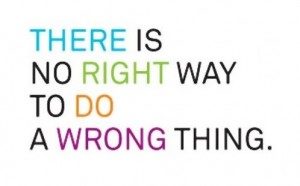 Business Ethics. It’s a college course, a magazine, a journal, a type of governance and a philosophy. Consider for a moment for yourself and your business if your ethics are a practice and a conviction. Are they the same as they were 20 years ago or are you suffering from an ethical drift?
Business Ethics. It’s a college course, a magazine, a journal, a type of governance and a philosophy. Consider for a moment for yourself and your business if your ethics are a practice and a conviction. Are they the same as they were 20 years ago or are you suffering from an ethical drift?
The whole ethical cocktail is a broad category and there are many definitions to choose from:
The topic seems appropriate in a decade where the most visible financial entities have breached the trust of the global community. Could it be boiled down to doing what you say you are going to do and acting in a responsible way? I queried business ethics in the urban dictionary and this is all that appeared under my search:
Is it easy to dissect ethics from business or does it come down to the alignment of personal and business ethics/values? Perhaps, we simplify this by saying ethics are the same regardless of whether they are business or personal. Ethics are defined by Webster as “rules of behavior that are morally right or wrong”.
Perhaps you are uncomfortable with Webster’s definition and don’t want to bring judgment into the discussion. However, judgment is required and “good” judgment is implied because subjectively and collectively we have to decide and define what acceptable behavior is by any businesses regardless of the corporate structure.
I bet you can relate to the feeling you get when you know something is not right. When it is not above-board. Many people in Wall Street and the financial business would not be indicted and serving time right now if the “right thing” governed them and they paid attention to that feeling of doing the “wrong thing”.
What the decisions and choices show us is those individuals; and, perhaps those companies, value something more than they value doing the right thing. Perhaps it’s money, power, or being number one. There are plenty of examples of what it costs firms to make an unethical choice.
A fascinating topic that emerged while researching this blog was the concept of ethical drift. This is a gradual erosion of ethical behavior that occurs in individuals below their level of awareness. Basically, the drift occurs because the standard or benchmark for comparison has changed over time. This has likely been occurring over time and it’s nothing new. However, it’s alarming to consider in this accelerated digital age that this drift may be evolving to something more significant – that would certainly explain a lot.
By Lynnette Leathers CEO of Mindspot Research

